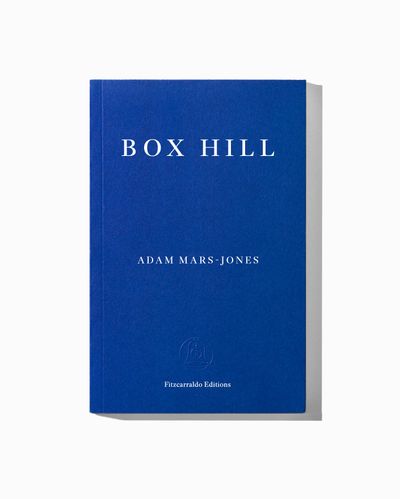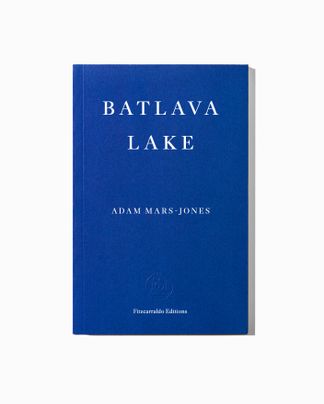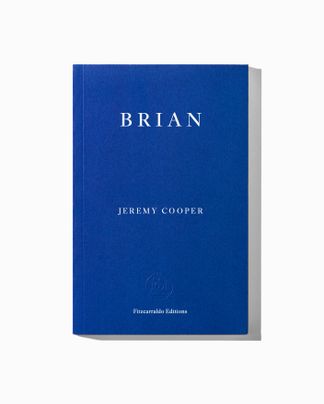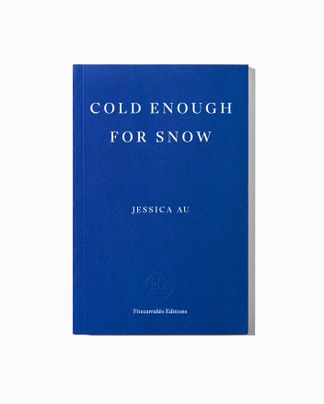On the Sunday of his eighteenth birthday, in 1975, Colin takes a walk on Box Hill, a biker hang-out. There he accidentally trips over Ray, a biker napping under a tree – and that’s where it all starts. This transgressive, darkly affecting love story between men, winner of the 2019 Fitzcarraldo Editions Novel Prize, is a stunning novel of desire and domination by one of Britain’s most accomplished writers.

Box Hill
French paperback with flaps, 128 pages | Audiobook read by Malcolm Sinclair
Published 18 March 2020
Box Hill
Box Hill where the bikers go, on a Sunday. Box Hill near Leatherhead in Surrey – jewel of the North Downs, rising almost 400 feet sheer above the river (that’s the river Mole). A cliff densely covered with box and yew. It’s the steepness of the gradient means only box and yew can get a foothold. It could just as easily be called Yew Hill as Box Hill, except box trees are so much rarer.
Box is the heaviest European wood. It doesn’t float. The roots were traditionally used for knife handles. Box trees are poisonous, same as yews. Only camels will eat the leaves, not because they’re immune but because they’re stupid, they don’t know what they’re doing. Box trees are used for mazes because the foliage is so dense, and they can be trained all the way down to the ground. A maze isn’t much cop if you can lie down on your belly, see where you are and wriggle out of it.
The leaves of the box are ovate, entire, smooth, thick, coriaceous and dark green. I looked that up. It sounds like a poem you can’t quite get the sense out of.
At Box Hill there’s downland grazed by sheep. A rich chalk flora. Orchids for those who know them when they see them. It’s a beauty spot overrun one day a week by motorcyclists and their beautiful machines. Bikes that whine, bikes that roar.
The Sunday of my eighteenth birthday: 1975. I went to look at the bikes. Because life at home wasn’t much fun, just at that moment, with Mum in hospital and Dad being unlike himself. Because I was going to get a bike of my own, one day soon. Because I liked to look at the bikers. Because it was my birthday, and I didn’t need a reason.
As far as riding my own machine, the closest I’d come to date was making the pilgrimage from Isleworth to Lewis Leathers in Great Portland Street, off Oxford Circus, to pick up a catalogue. Not very close. Tucked inside the catalogue was a leaflet telling you how to take your measurements for a one-piece suit. It had an outline of a human figure with arrows going this way and that, shoulder to wrist, inside leg.
I didn’t think the one-piece suit idea was going to work. The outline didn’t look much like me. A jacket in a standard size, once I could even afford that, would be a better bet. It would cover me up, though even so I wasn’t sure. If it was big enough for me to get the zip done up over my tum, the sleeves would be much too long, and I’d be swimming inside the shoulders.
I fell over him. I tripped and fell over him. When he told people about how we met, Ray always made that clear: Colin didn’t fall for me, he fell over me. Then he would continue the story with the bit that always made me uncomfortable. Ray would say, I took one look at him, and I saw what he really wanted.
I didn’t think I knew what I wanted, and I’m still not sure why he chose me. I was never a looker. I never had a waist. But Ray was dead drop gorgeous, though people didn’t say that then. It wasn’t a phrase. I didn’t think Ray was dead drop gorgeous in 1975. I was still reading teen magazines, and in 1975 the word in my mind was the word that teenagers used then. Ray was tasty.
I fell over him, just as he said. There’s a side of Box Hill I call the shorn side, near the panorama, where the grass is short and neat, and this was the other side, where the grass is shaggy and not so tidied up. He was sitting against a tree with his eyes shut – not that I saw him – and his big feet crossed in front of him. It was the feet I fell over, the size twelves.
He was probably sleeping off a late night with a stomach full of fry-up from the café at the bottom of the hill, where everybody was wearing leather but nobody wore their leather as well as he did. He was so used to being looked at that he didn’t notice any more. It would have been just like him, the person I came to know, to sit there reading a book after he’d finished eating. Military history. Something about the ocean and its creatures. He’s the only person I’ve ever seen who could turn a page wearing leather gloves and not fumble.
(…)
‘Adam Mars-Jones has never needed to write at great length to convince readers of his talent…. Mars-Jones’s latest work is a sliver of a novel that provides ample evidence of his prowess…. Box Hill is not a novel for the prudish, but it is a masterclass in authorial control…. Despite its diminutive length, it is rich with detail and complexity, and has plenty to demonstrate Mars-Jones’s well-deserved place on any list of our best.’
— Alex Nurnberg, Sunday Times
‘The biggest small book of the year.’
— Guardian
‘An exquisitely discomfiting tale of a submissive same-sex relationship … perfectly realised.’
— Anthony Cummins, Observer
‘A subtle, biting novella…. Although repressed boomers of Surrey are probably not the target audience of this intimate, stirring novel, they would probably enjoy this portrait of an impossibly lost age.’
— Martin Chilton, Independent
‘A clever and subtle novel.’
— Max Liu, Financial Times
‘The very best novel of the year was Adam Mars-Jones’s complex, shifting and sensationally lewd Box Hill – for once in 2020 a novel written not to make an approved point or demonstrate its author’s virtue but to explore calmly the wildest stretches of human behaviour. Its subject is cruelty, both theatrically performed and executed in reality, without costumes. A masterpiece that Dame Ivy would have been greatly interested by.’
— Phillip Hensher, Spectator
‘A relationship that could seem profoundly unfair blossoms into a revelation of love and magic.’
— Kirkus
‘It is a testament to Mars-Jones’s skill that we finish the book with everything illuminated, and yet, quite properly, everything left in the dark.’
— Telegraph
‘There’s an endearing anti-glamour to this novel, from its geographical setting – the bikers live in suburban locales rarely featured in contemporary fiction, such as Woking and West Byfleet – to its affectionate evocation of the cultural landscape of the 1970s – a world of shandies, Wimpy, Advocaat, obsolescent British-made bikes and the word “naff.”’
— Houman Barekat, Spectator
‘I very much enjoyed Box Hill. It is a characteristic Mars-Jones mixture of the shocking, the endearing, the funny and the sad, with an unforgettable narrator. The sociological detail is as ever acutely entertaining.’
— Margaret Drabble
‘A tender exploration of the love that truly dare not speak its name – that between master and slave. On his eighteenth birthday, Colin literally stumbles upon a strapping biker twice his age, and falls into a long-term relationship characterised by devotion, mystery, and submission. In plain unadorned prose, Mars-Jones shows us the tender, everyday nature of this. Self-deprecating, sad, and wise.’
— Fiona McGregor
Praise for Cedilla
‘The most original novel of the year.’
— TLS Books of the Year
‘One of the most brilliant fictional projects of recent years.’
— Spectator
‘One of the most original comic creations in recent fiction. You won’t regret going along for the ride.’
— Guardian
Praise for Pilcrow
‘Mars-Jones’s prose is exceptionally nimble, dry, humorously restrained, very English, with a little Nabokovian velvet too. He can describe more or less anything and make it interesting.’
— James Wood, London Review of Books
‘Truly exhilarating.’
— Sunday Times
‘Remarkable … A gripping, tragicomic, Proustian tale, presenting a world at once wholly convincing and wholly surprising … I long to know what happens next to its brave and gallant narrator.’
— Margaret Drabble, New Statesman
Adam Mars-Jones’ first collection of stories, Lantern Lecture, won a Somerset Maugham Award in 1982, and he appeared on Granta’s Best of Young British Novelists lists in 1983 and 1993. His debut novel, The Waters of Thirst, was published in 1993 by Faber & Faber. It was followed by Pilcrow (2008), Cedilla (2011) and Caret (2023), which form the first three parts of a semi-infinite novel series. His essay Noriko Smiling (Notting Hill Editions, 2011) is a book-length study of a classic of Japanese cinema, Yasujiro Ozu’s Late Spring. His memoir Kid Gloves was published by Particular Books in 2015. He writes book reviews for the LRB and film reviews for the TLS. He has published two novels with Fitzcarraldo Editions, Box Hill and Batlava Lake.




